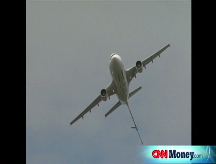Oil jumps $2 on Iran, storm
Crude prices bounce back from $16 slide as Iran nuclear talks end without agreement and traders fear tropical storm in Gulf of Mexico.
NEW YORK (CNNMoney.com) -- Oil prices rebounded strongly Monday, following the largest four-day slide in trading history, as investors focused on a break down of negotiations with Iran, as well as Tropical Storm Dolly, which is making its way into the Gulf of Mexico.
Light, sweet crude oil for August delivery settled up $2.16 to $131.04 a barrel.
Oil endured a volatile session, bouncing between $129 and $130 for much of the morning before rebounding later in the session.
"This is the bulls' last gasp before the contract expires Tuesday," said Stephen Schork, editor of the energy industry newsletter The Schork Report. "The bulls had been running scared because of the huge declines we had."
Oil prices fell more than $16 a barrel over the previous four sessions, as the market focused on a possible thawing of U.S. and Iranian tensions, and investors feared that tight supplies may have eased a bit.
But negotiations between Iran and six Western nations over the Middle Eastern nation's nuclear ambitions broke down Saturday when Iran scoffed at a call to freeze its uranium enrichment plans.
The U.S. government, represented by Undersecretary of State William Burns, was discouraged by Iran's lack of concessions. Policy analysts believe that Iran's response could set the stage for a new round of sanctions on Iran by the United Nations.
Oil traders had been encouraged leading up to the weekend meeting, but their fears about access to Iran's oil supply were restored when the talks did not yield positive results.
"The hope was that tensions would be diffused so Iran could avoid sanctions," said Alaron Trading senior market analyst Phil Flynn.
Gulf storm: Traders also feared that Tropical Storm Dolly could interrupt drilling in the Gulf of Mexico. The storm hit the Yucatan Peninsula in Mexico over the weekend and reached the Gulf of Mexico Monday afternoon.
"The market is buying rumors of Dolly, because inventories are already so overdrawn," said Flynn. "They're probably overreacting, because it could only be a Category 1, but potentially any Gulf storm is disturbing."
It doesn't necessarily take a strongly active hurricane season to cause major disruption to oil drilling in the Gulf, however.
"The makeup of a storm can have all the difference," said Flynn. "Slow moving storms have a tendency to churn up underground pipelines, so you don't need a Category 5 to do a lot of damage."
The average hurricane halts oil drilling production for over a week, according to the American Petroleum Institute. Rig workers are forced to evacuate two to three days before the storm hits, and as soon as it's safe to return, they have to check for damage before they can restart production.
But by midday, it became apparent that Dolly's path would not interfere with many offshore rigs, according to Schork, and investors instead focused on the expiring contract.
Contract nearing expiration date: The August contract is set to expire Tuesday, which produced a volatile session Monday. Tuesday is expected to be equally erratic.
Speculators generally sell their contracts to producers just prior to the contracts' expiration so that the investors do not need to accept shipment of oil barrels.
"That sell-off date is so close, so it adds a bit more volatility to the market," said Neal Dingmann, senior energy analyst with Dahlman Rose & Co. "Generally, on the expiration day, traders are trying to sell off their contracts."
Crude was still trading about $16 below its record of $147.27 set July 11.
Gas prices: The price of a gallon of regular unleaded gasoline fell to $4.069, down from $4.077 the previous day, according to a daily survey from motorist advocacy group AAA. ![]()



